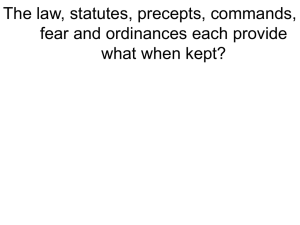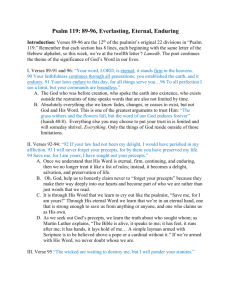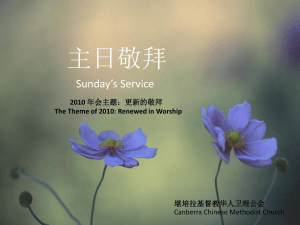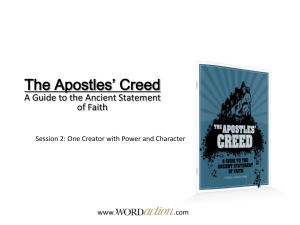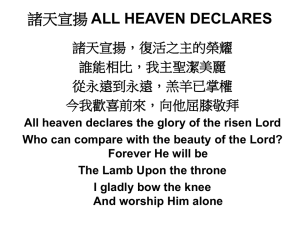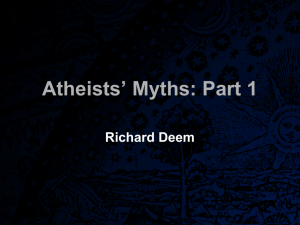TEXT: Psalm 119:89-96 - Grace Baptist Church
advertisement
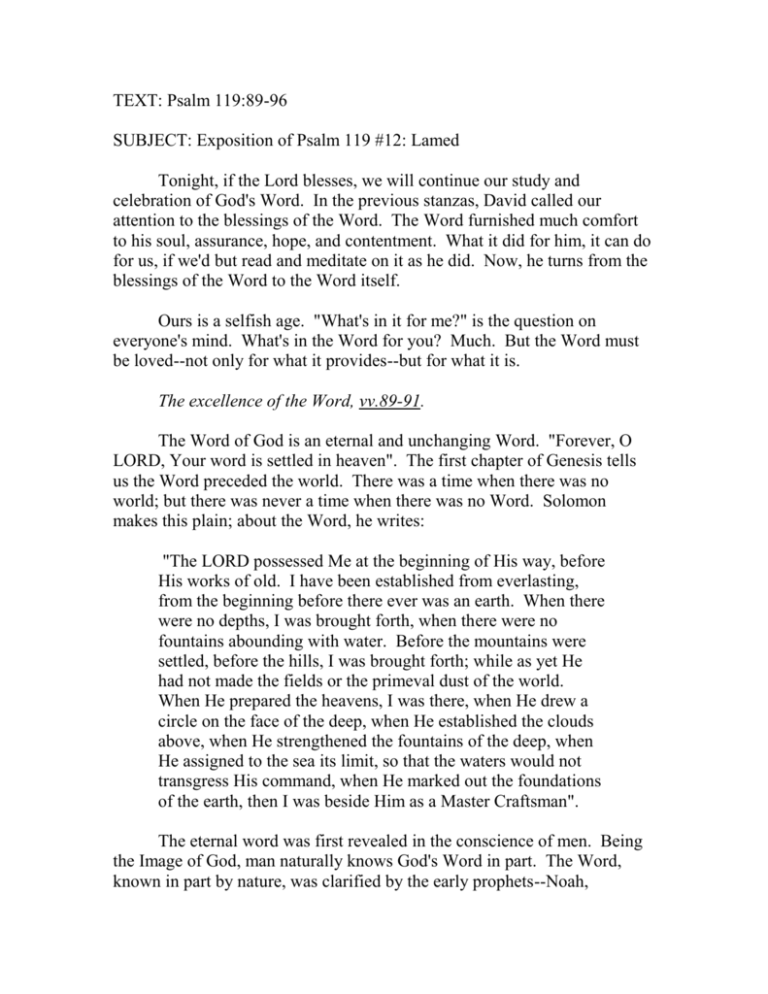
TEXT: Psalm 119:89-96 SUBJECT: Exposition of Psalm 119 #12: Lamed Tonight, if the Lord blesses, we will continue our study and celebration of God's Word. In the previous stanzas, David called our attention to the blessings of the Word. The Word furnished much comfort to his soul, assurance, hope, and contentment. What it did for him, it can do for us, if we'd but read and meditate on it as he did. Now, he turns from the blessings of the Word to the Word itself. Ours is a selfish age. "What's in it for me?" is the question on everyone's mind. What's in the Word for you? Much. But the Word must be loved--not only for what it provides--but for what it is. The excellence of the Word, vv.89-91. The Word of God is an eternal and unchanging Word. "Forever, O LORD, Your word is settled in heaven". The first chapter of Genesis tells us the Word preceded the world. There was a time when there was no world; but there was never a time when there was no Word. Solomon makes this plain; about the Word, he writes: "The LORD possessed Me at the beginning of His way, before His works of old. I have been established from everlasting, from the beginning before there ever was an earth. When there were no depths, I was brought forth, when there were no fountains abounding with water. Before the mountains were settled, before the hills, I was brought forth; while as yet He had not made the fields or the primeval dust of the world. When He prepared the heavens, I was there, when He drew a circle on the face of the deep, when He established the clouds above, when He strengthened the fountains of the deep, when He assigned to the sea its limit, so that the waters would not transgress His command, when He marked out the foundations of the earth, then I was beside Him as a Master Craftsman". The eternal word was first revealed in the conscience of men. Being the Image of God, man naturally knows God's Word in part. The Word, known in part by nature, was clarified by the early prophets--Noah, Abraham, Jacob, and so on. That Word was further clarified by Moses; He was clarified by the prophets; they were clarified by John the Baptist; all were clarified by the Incarnate Word, Hebrews 1:1. Christ is God's final word, for in Him the Eternal Word is fully disclosed. "No one has seen God at any time. The only begotten Son, Who is in the bosom of the Father, He has declared Him". If the Eternal Word had no beginning, neither will it have an end. "Everything has an end--said the Viennese philosopher--but a sausage; it has two". What he said in jest is true. Men grow old and die; empires decline and fall; ideas lose their power and are forgotten. This night "the world is passing away and the lusts thereof". Some day "the heavens will pass away with a great noise and the earth will melt with fervent heat". But the Word? It is unaffected by the passing of time. It cannot grow old; it cannot decline; it cannot lose its power. Heaven and earth must pass away, but the Word cannot! "Forever" must be taken in the most literal sense. No beginning; no end. The Word, unchanged Unchanging. How, in this world of decay, is an unchanging Word possible? Here's how: the Word is not of this world! It is "settled in heaven". What does this mean? Archibald Alexander has it: "Beyond the reach of all disturbing causes". Have men sought to disturb the Word? Yes they have, from the beginning. Have they succeeded? No they haven't. Peter knew men who "twisted" the Word, but it was "to their own destruction"--not the Word's. David knew men who laughed at it; but the joke was on them--not the Word. "He who sits in heaven shall laugh them to scorn; The LORD shall hold them in derision". Because the Word is eternal, fixed, and heavenly, we can be sure that God will stick by it. And not for a time, but for all time. His "faithfulness endures to all generations". He will honor His promises; He will carry out His threats--without exception. The Word is "settled"--fixed, established, or permanent. This brings no little comfort if true. But is it? You needn't look past your own feet to know that it is. "You established the earth and it abides". Long ago, God created the earth and made it a solid place on which Man could obtain a footing. And now, you're standing on that very same earth. Is it giving way under you? No. Why not? Because God is able to make it stand up. If He's able to do that with the earth, why can't He do the same with His Word? If you can't stand up, look up. The heavens also "continue this day according to [His] ordinances". The sun comes up every morning-and always in the east. The stars appear each night--just where they belong. The moon passes through its monthly phases--every month. The heavens are "settled"; so is the Word. What an excellent Word we have! In a world of sinking sand, we have a solid rock. Response to the Excellent Word, vv.92-96. What is the proper response to this Excellent Word? David tells us. 1. We must take pleasure in it. "Unless Your law had been my delight, I would have perished in my affliction". David took great pleasure in the Word; how great? V.162 hints at it: "I rejoice at Your word as one who finds great treasure". Is he exaggerating his love for the Word? No, quite the opposite, he's understating the case! For in 19:10 he says: "More to be desired are they than gold, yes, than much fine gold..." This is something the legalist can never do. He can read the Word, of course; talk about it; even obey it to some degree. But he can never--ever--"Delight in the law of God in the inner man..." But, renewed by grace, David could. And did. Do you? God "desires truth in the inward parts". What He desires of us, He can also give to us: "And in the hidden part [He] shall make us know wisdom". 2. We must meditate on it. "I will never forget Your precepts, for by them You have given me life". In Eastern Religion, meditation stands for emptying the mind. In the Bible, it means filling the mind with God's Word. a. It is commanded in both Covenants. Deuteronomy 11:18: "Therefore you shall lay up these words of mine in your heart and in your soul, and bind them as signs on your hand, and they shall be as frontlets between your eyes". Cf.Philippians 4:8. b. It is practiced by godly men in every age. Psalm 1:2. c. Our Lord Jesus meditated on the Word. Psalm 40:8. 3. We must obey it. "I am Yours, save me, for I have sought Your precepts". To seek His precepts doesn't mean to look for your misplaced Bible, but to seek to do them. To become "a doer of the Word and not a hearer only". If the Word is excellent, why not put it into practice? How can you say it is if you don't? This seeking of His precepts is not legalism! For it springs from gratitude and is carried on in joy and thanksgiving. It is cheerful obedience God wants. He can obtain reluctant obedience from the devil! He wants yours freely. 4. We must wonder at it. Someone has said "The beginning of philosophy is wonder". This is no less true of piety. It begins with a wondering at God and His Word. David saw "the consummation of all perfection"--i.e., the boundaries of all things on earth and in heaven. How immense the seas are! The size of the galaxies boggle the mind! But it is not the sea or the sky at which he wonders--but the Word. "Your commandment is exceedingly broad". Why? Because it reveals "the width and length, depth and height of the love of Christ which passes knowledge...and fills us with all the fullness of God." Close. Pity the poor souls who lack "the excellent word". Let us be up and about bringing it to them! But pity even more the poor souls who have "the excellent word", but don't use it. "To whom much is given, much will be required". You own a Bible. Therefore, you ought to be in it--reading it, reflecting on it, obeying it, and wondering at God's great goodness in giving it to you. You don't deserve such a gift! Neither do I! But we have it. Let's use it. In the right way. Not as the Jews did--to inflate themselves, but as the early believers did--to magnify Jesus Christ. John 5:39.
